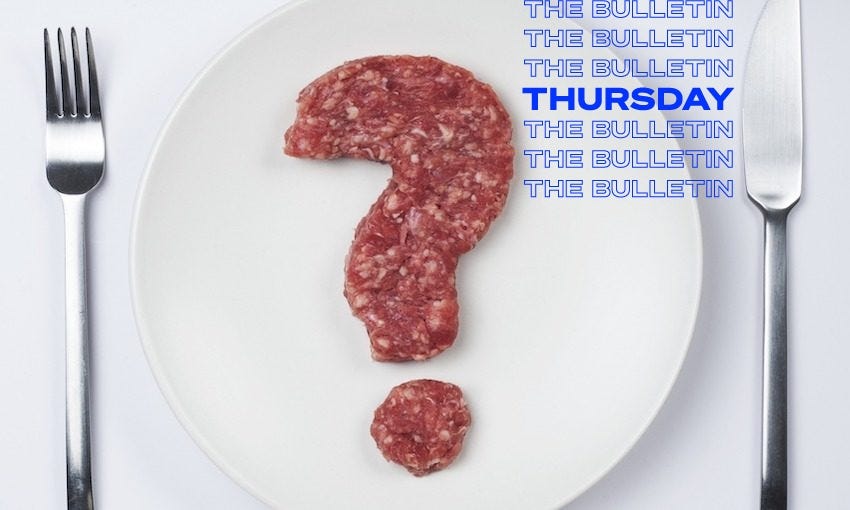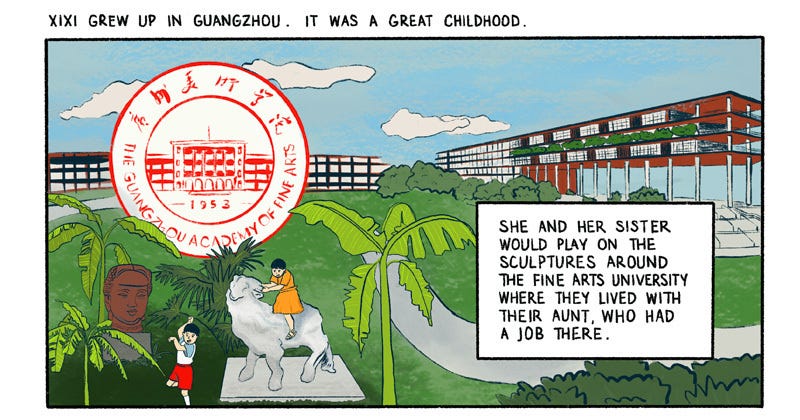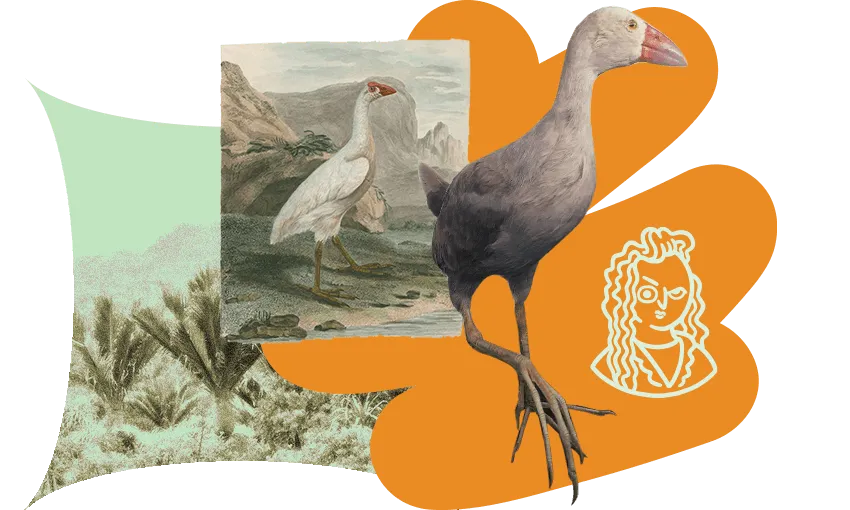Is the future meat-free?
A headline that ran yesterday said “Global veganisation is now a survival imperative” but where did the call come from?
Mōrena and welcome to The Bulletin for Thursday, June 9, by Anna Rawhiti-Connell. Presented in partnership with Z Energy.
In today’s edition: He Waka Eke Noa plan released; submissions open on new surrogacy bill; trial begins in NZ First Foundation case; but first, tracing a call to urgently go vegan.
Questioning the future of meat (Photo: Getty Images)
“Global veganisation is now a survival imperative”
What a headline. It caught my eye in a story from RNZ yesterday and seemed like something we should be talking about. It wasn’t the milder “cut down on meat” or “eat more plant-based foods” but a more urgent message. The report says a group including “Nobel laureates, 14 cities and 40,000 individuals are urging countries to transition to plant-based food” and quotes Intergovernmental Panel on Climate Change (IPCC) expert reviewer Dr Peter Carter saying “the global climate catastrophe could not be averted without the elimination of meat and dairy from diets”.
Where was the call coming from?
I googled for more information. It was specifically topical yesterday as the He Waka Eke Noa group reported back on their plan to price agricultural emissions (more on that below). The ODT and TVNZ picked up the story from RNZ. I was just keen to know where the call was coming from, who the Nobel laureates were and whether I'd missed a new report summary on upping the stakes on plant-based diets and the climate crisis that New Zealand officials hadn’t watered down. This isn't prompted by scepticism or denial of the scientific basis for this course of action but what I do each day when selecting stories for The Bulletin.
Grassroots initiative to present a position paper in Germany
As explained near the end of the RNZ story, it comes from a group called The Plant Based Treaty which is a grassroots initiative and campaign designed to put food systems at the forefront of combating the climate crisis. They are in Germany for the climate change conference, are presenting a position paper and embarking on a week of activism. It is endorsed by Nobel Laureates – five, to be exact – who are listed on their website. The group of 40,000 are those who’ve signed the treaty on their website and the cities include 13 in India, which has the world's largest vegetarian population.
IPCC report acknowledges complexity of changing diets
As I say, I am not attempting to question the validity of the call or debunk the science that supports it but this was an interesting provocation to look at the travel of news headlines on a big gnarly issue. Changing your diet isn’t simple, no matter the urgency of the call. Food is inherently political and what you eat is often culturally sensitive and constrained by your household budget. It’s really worth reading this summary from Stuff’s Eloise Gibson of the food-based recommendations from the last IPCC report which acknowledges a lot of this. The Guardian also ran a good piece the other day on how partial shifts from meat-based menus could still significantly decrease planet-heating emissions. This from Forbes is also a great conversation between scientists on why it’s hard to discuss the decarbonisation of food systems.
Chinese Languages in Aotearoa is a project by Te Papa to highlight the complexity of cultural identity within Chinese New Zealand communities. To learn more about the project read our interview with curator Grace Gassin. In partnership with Te Papa, we’re featured a panel above from a new short comic created by K Emma Ng (吴佩賢) for the project.
“Xixi’s story is one of strength and grace. I was drawn to the way that relearning her mother tongues is playing a part in a larger process of reconnection and healing. With this comic, I tried to strike a balance - while many of Xixi’s experiences have been difficult (reflecting challenges that migrant communities and children sometimes face), I wanted to make sure I also included some of the positive relationships and moments that have shaped Xixi’s life.”
To read the full comic, click here (sponsored)
He Waka Eke Noa plan released
Yesterday the plan to price agricultural emissions was released. The plan will require every farm to report their emissions numbers, put a greenhouse gas management plan in place and pay levies related to the amount of methane and nitrous oxide emissions that farm releases. Writing for Farmer’s Weekly, Richard Rennie said the responsibility for reducing greenhouse gas emissions will be falling firmly within the farm gate. Groundswell isn't happy saying it will put farmers out of business. RNZ listeners this morning seemed to be in the “excuses, excuses, excuses” camp in response to that. Writing for Newsroom Pro this morning, Marc Daalder (paywalled) says the plan “is rooted in wishful thinking about technology that is not yet proven at scale”. As climate change minister James Shaw was being cautious saying he was waiting to get more advice from officials and the Climate Commission. As co-leader of his own party he said the Greens thought the proposal was “lame”.
Public submissions open for Surrogacy Bill
Submissions are now being called for on Labour MP Tāmati Coffey's Improving Arrangements for Surrogacy bill. The bill seeks to simplify surrogacy arrangements. The government requested a review of surrogacy in late 2020 and a Law Commission report published in late May found the existing legal framework for surrogacy is out of date. Parents wanting to embark on surrogacy have to rely on the Adoption Act which is 65 years old. Those laws are also under review. The commission review was carried out separately to Coffey’s bill. An expert in reproductive law and member of the commission’s advisory group, Margaret Casey, spoke to Kim Hill about the issue on Saturday.
A message from senior writer Alex Casey:
Earlier in the year we published When the Lessons End, an in-depth examination of one woman’s experience at the hands of her private music teacher, and the impact it had on the rest of her life. Stories like these take months of rigorous reporting, travel costs and hefty legal fees to get to publication stage, all of which was only possible thanks to our members.
I feel so lucky to work for an organisation that encourages long-form investigative journalism, but the reality is that this work is impossible without the ongoing support of our readers. If you can, please support our work by donating today.
Trial starts in NZ First foundation case
The trial of two men accused of operating a scheme to fraudulently conceal nearly $750,000 of party donations started in the High Court in Auckland on Tuesday. In his opening address, Paul Wicks QC, acting for the Serious Fraud Office, said “between 2015 and 2020, about 40 donors to the New Zealand First Party believed their donations were going to the party, but they didn’t because of a fraudulent device, trick or stratagem by the defendants.” The two men still have name suppression despite multiple attempts by the media to oppose it. As reported by the Herald’s Sam Hurley, yesterday’s proceedings saw political consultant Apirana Dawson give evidence. Dawson said party leader Winston Peters was often frustrated at a lack of fundraising efforts, and a lack of a steady stream of donations was one of the reasons the foundation was created.
Got some feedback about The Bulletin, or anything in the news? Get in touch with me at thebulletin@thespinoff.co.nz
An unusual taxidermy in a Northland antique shop has ruffled feathers in the international rare bird community. Alex Casey investigates the curious case of Waipū’s pale pūkeko. Toby Manhire talks to Tuvalu's foreign minister Simon Kofe about climate change and national security. Linda Burgess reflects on the enduring legend of the Ingham twins following Joanne's untimely death this week. Sam Brooks talks to one of the engineers tasked with exterminating the revolting 'rag monsters' lurking in Wellington's sewers.
About bloody time
I remember attending a women in rugby conference back in my days of being on a provincial union board and having the somewhat incredulous discussion about a lack of women’s changing room facilities at our stadiums and rugby clubs. Eden Park has just unveiled new facilities that provide female athletes with individual showers, privacy screens, cubicle toilets, baby change tables, sanitary bins and accessible bathrooms. Black Fern Charmaine McMenamin succinctly outlined the previous situation by saying “Normally there is always a urinal and maybe one toilet in a changing room and when you have a team of 23 women trying to go toilet before the game it gets a bit hectic.” The upgrade was part of a funded initiative for facilities being used in the upcoming women’s rugby and football world cups being held in New Zealand.
Thunder of distant war
A feature for you today from Pete McKenzie in New Zealand Geographic on those living in New Zealand with ties to the war in Ukraine and the proximity to it provided by social media.












The north and south story you shared the other day about farming and agricultural emissions really has me thinking - in particular there’s a line in it about the neo-colonial influence on prioritising methane reduction over carbon, cos it’s easier for western developed countries to reduce methane than it is carbon - and I can’t help but wonder if that influences this drive to plant based diets!
What a great selection of stories, Anna! Speaking as a 76 year old Pākehā male, who still likes to eat some meat, but a lot less of it, I take on board the idea that the future may become meat-free - or at least a lot freer. Above all, I am responding as a fan of - and modest donor to - The Spinoff, to say that your selection, from start to finish, confirms my hope that the future will also be indigenous- and female-led. Us white boys have a lot to rediscover and learn. Don Quick